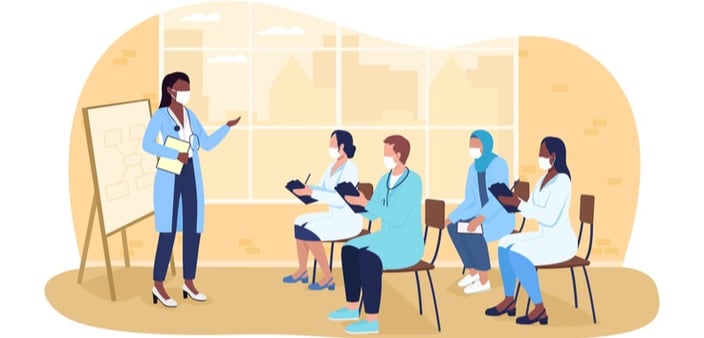 Health disparities are the health differences experienced between different groups based on race, ethnicity, disability, sex/gender, socioeconomic status, educational level, and more. Unfortunately, the LGBTQ+ community is no exception to health disparities.
Health disparities are the health differences experienced between different groups based on race, ethnicity, disability, sex/gender, socioeconomic status, educational level, and more. Unfortunately, the LGBTQ+ community is no exception to health disparities.
Health differences in the LGBTQ+ community can include how many people contract a specific disease, how severe the condition becomes, the complications associated with the disease, how many people die from an illness, access to healthcare, and how many people can access preventative health screenings.
Health disparities within the LGBTQ+ community can affect every aspect of a person's life, including physical and mental health. As healthcare providers, we are responsible for identifying health disparities and continually working toward bridging these gaps so every person can receive quality healthcare and routine health screenings.
Barriers to Healthcare in the LGBTQ+ Community
Research has revealed that LGBTQ+ individuals are less likely to have access to quality healthcare for a variety of reasons, including
- A lack of inclusive and competent healthcare providers with knowledge of LGBTQ+ health and health issues affecting transgender persons.
- The concern of stigma or discrimination from healthcare providers
- Prior negative experiences from LGBTQ+ persons
- The financial burden of affording health insurance or paying out of pocket for care
- Being refused care due to sexual orientation, gender identity, or gender presentation
Regardless of the reason behind healthcare barriers within the LGBTQ+ population, there are several health disparities that healthcare workers must educate themselves upon to help better serve the community. Here are some of the most prominent health conditions affecting LGBTQ+ people and what you can do to help better serve your patients.
Sexually Transmitted Infections (STIs)
Gay, bisexual, and other men who have sex with men are more affected by certain STIs, including HIV (human immunodeficiency virus) and HPV (human papillomavirus), than other individuals. Many people in the LGBTQ+ community hesitate to seek medical care due to the potential stigma and judgment they may receive about their lifestyle, which can lead to worse medical outcomes. As medical providers, we must create a safe, inclusive, and judgment-free space for people within the LGBTQ+ population to receive medical care.
To better serve the LGBTQ+ population, Nurses must educate themselves on the increased health risks of the LGBTQ+ community and ensure that every patient receives routine health screenings and health education. It can be difficult and embarrassing for any person to seek medical care for sexual health concerns or screenings, so it is essential to create a nonjudgmental, inclusive, and caring environment for patients to feel comfortable disclosing sexual information and receiving care.
Anxiety and Depression
It is estimated that up to 60% of the LGBTQ+ population deals with anxiety and depression at some point. Unfortunately, LGBTQ+ people experience worse mental health outcomes than other communities. Factors behind anxiety and depression in LGBTQ+ people can range from discrimination, bullying, lack of acceptance from friends and family, lack of representation in school and media, lack of inclusive language, and less access to community support.
As a healthcare professional, you can better support the well-being of the LGBTQ+ community by creating and welcoming a safe environment free of judgment and stigma. We can also work to provide better mental health services. The Trevor Project is a fantastic resource for LGBTQ+ patients struggling with anxiety and depression. The Trevor Project offers trained counselors who can be reached 24/7 by phone or text. Every counselor is trained to understand the unique challenges of the LGBTQ+ community, and every conversation is 100% free and confidential.
Drug and Alcohol Abuse
Statistics show that people within the LGBTQ+ community are twice as likely to suffer from drug and alcohol abuse than other populations. This is mainly attributed to the fact that the LGBTQ+ community faces discrimination, social stigmas, and a general lack of support despite the growing acceptance from strangers, acquaintances, friends, and family. Drugs and alcohol are often used as a coping mechanism for those struggling with anxiety, depression, and other insecurities.
To better support the LGBTQ+ community struggling with drug and alcohol abuse, healthcare providers can use motivational interviewing and screening tools to better identify individuals who may be struggling so we can better provide care and support. Furthermore, healthcare professionals should approach these situations with kindness and understanding while using inclusive language to help patients navigate recovery.
There are many resources available to the LGBTQ+ community who are interested in living a sober life, including Gayandsober.org, where the LGBTQ+ community can connect with other LGBTQ+ people living a sober life, and Inspire Recovery, where the LGBTQ+ community can seek resources to achieve and maintain sobriety.
Be an Advocate
Everyone, regardless of their age, gender, sexual orientation, or race, should receive competent, compassionate, and inclusive medical care. As Nurses, we must always advocate for our patients and strive to provide every person with the best possible care. To help reduce health disparities in the LGBTQ+ community, Nurses should educate themselves on how to care for people within the community and advocate for health screenings and competent medical care for every individual.
To learn more about how Nurses can better serve the LGBTQ+ community, consider checking out these resources.
Center for Disease Control and Prevention: LGBTQ Health Services


 Patient education is a crucial aspect of the Nursing practice, because it empowers patients to take an active role in their own healthcare. Nurses serve as educators, providing patients and their families with the knowledge and skills they need to make informed decisions about their health and well-being.
Patient education is a crucial aspect of the Nursing practice, because it empowers patients to take an active role in their own healthcare. Nurses serve as educators, providing patients and their families with the knowledge and skills they need to make informed decisions about their health and well-being. A positive workplace culture is essential for Nurses to provide excellent patient care. In addition, a positive workplace culture on Nursing units can positively impact job satisfaction, staff retention, and patient outcomes.
A positive workplace culture is essential for Nurses to provide excellent patient care. In addition, a positive workplace culture on Nursing units can positively impact job satisfaction, staff retention, and patient outcomes. Versailles, Ky. – On June 8-9, 2023, Frontier Nursing University (FNU) will hold its
Versailles, Ky. – On June 8-9, 2023, Frontier Nursing University (FNU) will hold its 

 May is mental health awareness month, a time to
May is mental health awareness month, a time to  Healthcare should be accessible to everyone regardless of socioeconomic status, age, gender, race, or ethnicity. Unfortunately, many people across the nation struggle to access affordable and reliable healthcare. Health equity can only be achieved when every person, regardless of the situation, has a fair and equal opportunity to be as healthy as possible.
Healthcare should be accessible to everyone regardless of socioeconomic status, age, gender, race, or ethnicity. Unfortunately, many people across the nation struggle to access affordable and reliable healthcare. Health equity can only be achieved when every person, regardless of the situation, has a fair and equal opportunity to be as healthy as possible.  Nurse gig shifts refer to temporary or short-term Nursing assignments that are often offered through staffing agencies or online apps. These shifts can range in length from a few hours to several weeks or months and are often taken by Nurses who are looking for flexible work arrangements or who want to supplement their income.
Nurse gig shifts refer to temporary or short-term Nursing assignments that are often offered through staffing agencies or online apps. These shifts can range in length from a few hours to several weeks or months and are often taken by Nurses who are looking for flexible work arrangements or who want to supplement their income. There is a growing need for more Nurse Educators to address the current shortage of Nurses and ensure the future generations of Nurses are well-trained and prepared to provide quality care.
There is a growing need for more Nurse Educators to address the current shortage of Nurses and ensure the future generations of Nurses are well-trained and prepared to provide quality care. Maternal health disparities are a significant problem in the United States. W
Maternal health disparities are a significant problem in the United States. W As Nurses, death can be a regular, everyday occurrence. But just because we encounter death frequently does not mean that experiencing the loss of a patient won't impact us. In this profession, we care for people when they are at their most vulnerable, and we create meaningful relationships with many of our patients and their families.
As Nurses, death can be a regular, everyday occurrence. But just because we encounter death frequently does not mean that experiencing the loss of a patient won't impact us. In this profession, we care for people when they are at their most vulnerable, and we create meaningful relationships with many of our patients and their families.